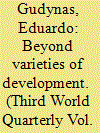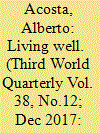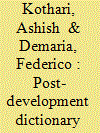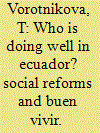|
|
|
Sort Order |
|
|
|
Items / Page
|
|
|
|
|
|
|
| Srl | Item |
| 1 |
ID:
144260


|
|
|
|
|
| Summary/Abstract |
Many South–South cooperation programmes have promoted development without fully discussing the implications of that concept. To evaluate this situation, recent heterodox development strategies are examined, particularly those under progressivist governments in South America. It is found that development strategies are certainly plural, but they all share a common pre-political background. To address this feature, the concept of ‘varieties of development’ is introduced. Then a new typology on the disputes over development is presented. Three types are recognised (controversies within a specific variety of development; disputes among different varieties; and disputes on alternatives to all varieties of development). The concept of Buen Vivir is presented as an alternative to development, and disputes of the third type, that involve this concept, are examined. Paradoxically, as the current focus of South–South cooperation is to reinforce conventional varieties of development, it is blocking alternatives, even the Southern option of Buen Vivir.
|
|
|
|
|
|
|
|
|
|
|
|
|
|
|
|
| 2 |
ID:
156647


|
|
|
|
|
| Summary/Abstract |
In various parts of the world, growing and serious problems, especially economic, social and environmental, are increasingly calling into question the conventional ideas of progress. The lives of human beings are in danger. We are in ‘the age of survival’, a sort of crossroads in which the future of the human species is defined. That is why alternatives that exceed the dominant concepts typical of Modernity are arising from many sectors and places. Above all, natives are determined to recover their origins and even to strengthen their ancestral practices, from their past to project into the future. And there are those who try to build bridges between these different shores, from which it may be possible to build other worlds where life with dignity for all beings existing on the planet is a possibility.
|
|
|
|
|
|
|
|
|
|
|
|
|
|
|
|
| 3 |
ID:
156646


|
|
|
|
|
| Summary/Abstract |
This article lays out both a critique of the oxymoron ‘sustainable development’, and the potential and nuances of a Post-Development agenda. We present ecological swaraj from India and Degrowth from Europe as two examples of alternatives to development. This gives a hint of the forthcoming book, provisionally titled The Post-Development Dictionary, that is meant to deepen and widen a research, dialogue and action agenda for activists, policymakers and scholars on a variety of worldviews and practices relating to our collective search for an ecologically wise and socially just world. This volume could be one base in the search for alternatives to United Nations’ 2030 Agenda for Sustainable Development, in an attempt to truly transform the world. In fact, it is an agenda towards the pluriverse: ‘a world where many worlds fit’, as the Zapatista say.
|
|
|
|
|
|
|
|
|
|
|
|
|
|
|
|
| 4 |
ID:
165641


|
|
|
|
|
| Summary/Abstract |
DECENT LIFE, well-being, the common good, progress, and development are universal concepts, but they take different cultural and historical forms. In the early 21st century, the government of Ecuador launched a unique sociopolitical project with social inclusion, eradication of poverty, and equal opportunities being priority objectives
|
|
|
|
|
|
|
|
|
|
|
|
|
|
|
|
|
|
|
|
|